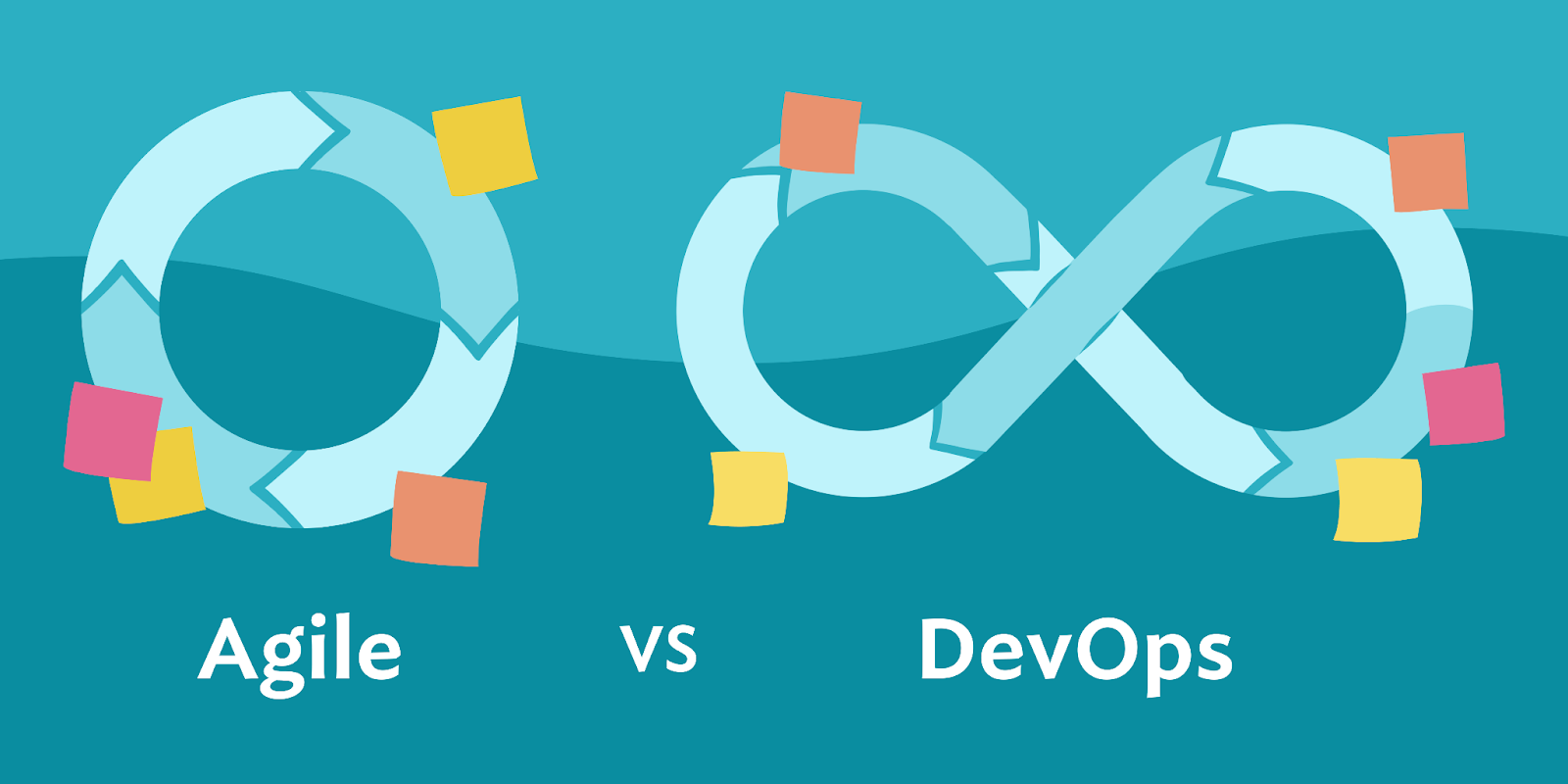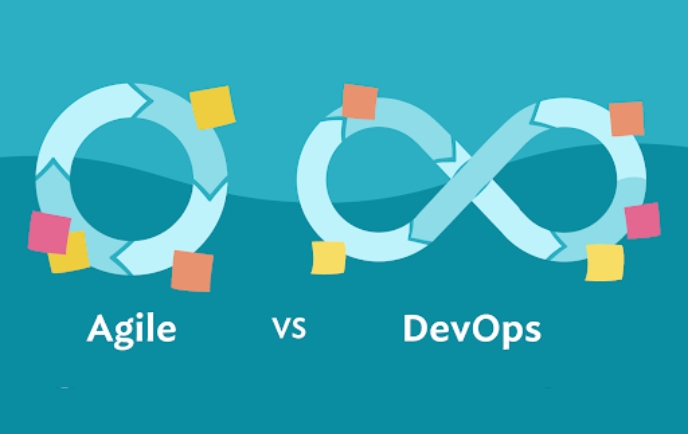Introduction
In the ever-changing world of technology, it is important to stay up to date on the latest trends and innovations. Agile and DevOps are two popular methodologies used in software development today.
Agile focuses on rapid delivery and iteration of products, while DevOps emphasizes collaboration between software developers and IT professionals. Both approaches have been successful in improving the speed and quality of software products, but deciding which methodology to use can be a difficult decision for organizations.
What is DevOps
What is DevOps? DevOps is an increasingly popular term in the technology world. In its simplest form, it combines software development (Dev) and IT operations (Ops). It seeks to improve the speed and frequency of software delivery by enabling greater collaboration between those in charge of deploying new code into production systems and those responsible for maintaining them.
The primary goal of DevOps is to reduce the time it takes to bring applications from concept to release while also improving the quality, reliability, scalability, and security of each release. By creating a more agile environment where development teams can quickly deploy code without having to worry about disruption or down
time, organizations can be better prepared for rapid growth or changes in their markets. Through automation processes like continuous integration/continuous deployment (CI/CD), developers can build higher quality products faster with fewer errors, which ultimately increases customer satisfaction.
Our DevOps training can undoubtedly advance your career if you are a person with an interest in DevOps.
What is Agile
Agile is an iterative way of project management that focuses on collaboration and speedy, high-quality results. It has become the de facto model for software development teams due to its flexibility, adaptability and scalability.
Agile methodologies emphasize communication between individuals on the team, as well as between the team and stakeholders, in order to ensure that everyone is on the same page when it comes to objectives and expectations.
At its core, Agile provides a framework under which teams can quickly deliver projects while being flexible enough to make changes should they be required by stakeholders or external factors. Its iterative process also allows for feedback from users during each stage of development so that mistakes are caught early and solutions are refined before a final product is delivered. This makes it easier for teams to work together towards their goal without getting bogged down by bureaucracy or lengthy processes.
Our Agile Training can undoubtedly advance your career if you are a person with an interest in DevOps.
History of Agile
Agile is an iterative and incremental development methodology that has been adopted by software developers to promote collaboration, flexibility, and quick response to changes. It was initially developed in 2001 by a group of 17 software developers who sought to create a more efficient and effective way of developing software.
Since its inception, agile has become one of the most widely used project management approaches for developing software as well as for other types of projects.
The Agile Manifesto was created with four core values: individuals and interactions over processes and tools; working software over comprehensive documentation; customer collaboration over contract negotiation; and responding to change over following a plan.
These values emphasize the importance of communication, flexibility, adaptation, customer focus, rapid feedback loops, delivering value early on in the process, user testing throughout development cycles and putting people first.
See Also : How ABM Technology helps in Evolving Modern Marketing
What Makes Agile and DevOps Different?

Agile and DevOps are two of the most popular methodologies used in software development today. But what exactly is the difference between them? On the surface, both Agile and DevOps appear to have similar objectives – to improve productivity, quality, and efficiency by automating processes and shortening feedback cycles. However, a closer look reveals important distinctions between them.
Agile is an iterative approach to software development that focuses on delivering customer value with speedy iterations or “sprints” while continuously testing and improving the product along the way. It emphasizes collaboration among teams, encourages customer feedback as part of its development cycle, and requires organizational commitment at every level for success.
DevOps is a culture-driven methodology that combines multiple tools and techniques to speed up software delivery while maintaining high-level standards of quality assurance.
Challenges in Adopting DevOps
DevOps is a software development philosophy that seeks to bridge the gap between development and operations teams. By adopting DevOps, organizations can achieve greater speed of delivery, flexibility, scalability and better quality products. However, while the benefits of DevOps are clear, many organizations still struggle with its successful adoption due to several challenges.
First and foremost is the cultural shift required for organizations to move from traditional siloed IT structures towards collaborative ones which are necessary for successful DevOps initiatives.
This shift requires a change in mindset across all organizational levels which can be difficult for some enterprises to accept. Furthermore, there is increased demand on developers who will have to learn new processes and tools quickly in order to succeed in a DevOps environment.
Benefits of Agile
The Agile software development method has become an industry standard for companies looking to improve their efficiency and output. It prioritizes collaboration, constant improvement, and communication between teams, allowing them to be more agile in times of rapid change. There are several advantages that make this method a great choice for businesses who want to stay ahead of the curve.
One of the primary benefits of Agile is its focus on customer feedback and requirements. By giving customers a say in how the product or service is developed, they can ensure that it meets their needs as well as those of their users or customers.
Additionally, Agile also encourages teams to be open-minded and adaptable when faced with changes or challenges in order to come up with innovative solutions quickly. This helps teams stay on top of trends while not missing out on opportunities due to inflexibility.
Benefits of DevOps
The development process is a critical component of any successful business. As technology continues to evolve, so too do the processes that are used to develop applications and software. Two popular frameworks for this purpose are Agile and DevOps. But which one offers more benefits? Let’s take a look at the advantages of using DevOps over Agile.
When it comes to DevOps, one of its main advantages is that it enables faster application delivery times. This means fewer delays in getting projects completed, which can be extremely beneficial for businesses who need to quickly implement new features or products.
In addition, DevOps also allows teams to deploy changes into production environments with much greater speed and reliability than traditional methods. This leads to fewer bugs and better scalability for your applications – making it easier for developers to add features or fix problems when needed.
Blog Suggestion: How Web3 in IoT will Bring Digital Transformation
Conclusion
In conclusion, Agile and DevOps are both excellent development processes that have revolutionized the software industry. Agile focuses on quick, iterative releases with strong customer collaboration and feedback, while DevOps is a culture of shared responsibility between development and operations teams. Each process has its own strengths and weaknesses, so ultimately the best solution will depend on the individual needs of your organization.
Frequently Asked Questions
Which is better, Agile or DevOps?
Agile and DevOps aim to deliver quality software within a stipulated time, but they have some differences. Agile development aims to provide quality software within a given time by following best practices.
DevOps focuses on continuous code deployment using modern tools and relevant automation processes. Many entities prefer to use DevOps as it is modern software that smoothens software development and operations.
Is DevOps replacing Agile?
DevOps is not replacing Agile, but it is a successor to Agile. Moreover, DevOps can effectively resolve many dependency issues, proven to be an optimized practice by many experts.
Is there a future in DevOps?
DevOps offers many promising career opportunities with steady growth. A Certified DevOps Engineer should possess extensive skills in the complete SDLC process. Also, he should have expertise in applying DevOps automation tools to accomplish several operations. These relevant skills will help you become a DevOps expert.
Do DevOps need coding?
Anyone interested in a career in DevOps must possess relevant coding and scripting skills. These coding skills will help to automate various tasks in real time.
What are the 4 key components of DevOps?
Below are the four DevOps key components:
- CI/CD Framework.
- Building Automation Tools.
- Code Testing
- Source Control
What are the most common DevOps roles?
The following are the typical job roles for DevOps engineers:-
- DevOps Evangelist
- Software Developer/Tester
- Automation Architect
- DevOps Engineer
- Release Manager
- Software Developer
We, at New Techno Times aim to provide the best technology information to readers to gain knowledge of what is going on in the world around us. For related blogs about cybersecurity and technology, Digital Marketing, Business, Education keep following us.

